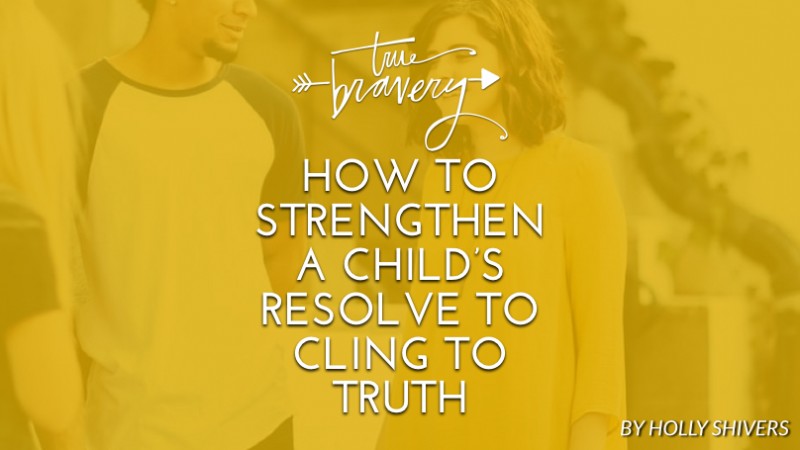Recently in our home, the background music of noisy toys and the Bubble Guppies theme song has given way to pre-teen shenanigans and muffled loud music coming from closed bedroom doors. It’s a wonderful, enjoyable season of life but with it comes a newfound awareness of what is coming. Releasing our kids into a culture that is so hostile to our biblical convictions no longer seems so distant. The train is bolting ahead, and there is no stopping it. As a result, I’ve been pondering from their perspectives two drastically contradictory messages. The message from their current environment (our home, our church) says, “God’s Word is always true and right, never waiver, you can trust it!” Then there is the secular message from the world, which (if it doesn’t already) will soon whisper, “You can’t say what is right or true for everyone, we all deserve happiness, so get out there, be brave, and do what’s right for you!” One view tells them there is one way only, the way of Jesus and Biblical principles (John 14:6). The other says that believing this makes you small-minded and that absolute truth is an insult to human intelligence.
Psalm 19:7 says, “The Law of the Lord is perfect, reviving the soul, and the testimony of the Lord is sure, making wise the simple.” 2 Timothy 3:16 reminds us that all scripture is “breathed out by God.” Revelation 22:18 warns us not to add to the words of God. And 1 Corinthians 2:14 states that the natural person does not accept or understand the things of the Spirit of God, for they are “spiritually discerned.”
So then, practically speaking, what can we do now to strengthen the resolve within our kids to stay bravely attached to the truth of God’s Word, no matter the opposition that could follow?
1. Give them a prototype.
If I am going to spend my energy teaching my children that God’s Word is enough, it best be enough for me as well. I must echo King David’s words, “You are my refuge and my shield, I have put my hope in your Word” (Psalm 119:114). My kids need to see me in my Bible. They need to hear my mouth utter words of Jesus. They need to watch me be courageous in my conversations.
2. Teach them to discern truth and lies.
Truth: God’s Word never changes; it is always the same (Matthew 24:35; Hebrews 13:8).
Lie: Your happiness comes first. You don’t need to worry about what others say; just trust your sovereign self!
Have the hard conversations (age appropriately) about specific truths and lies on all moral issues like abortion, sexual ethics, self-indulgence and so forth. (We are currently using this with our 14 year old).
3. Model respect for others.
The entire book of 2 Timothy speaks to boldness and endurance in the face of false teaching. In 2 Timothy 2:23-26, Paul tells Timothy, “Have nothing to do with foolish, ignorant controversies … Now the Lord’s servant must not be quarrelsome but kind to everyone, able to teach, patiently enduring evil, correcting his opponents with gentleness. God may perhaps grant them repentance leading to a knowledge of the truth and they may come to their senses …” (How is that for motivation?) Are we modeling meekness and gentleness in our interactions with those who oppose our views? Do we engage in jabbing matches on social media? Are we indirectly teaching our kids to feel superior to those who do not share their convictions? We must teach and practice tenderness and caution in these delicate conversations, for the sake of our gospel witness.
4. Let them hear you say, “I don’t know.”
If your desire is to impart haughtiness into your children, than imply to them that you possess all knowledge and that every scenario is black and white. There are going to be issues they face in life that scripture will not specifically address. Sometimes they will have to wrestle with the text, ask questions and seek counsel. Should I attend the same sex wedding of my college professor of whom I greatly respect? Do I give my friend from work a ride to and from the abortion clinic when she is all alone and has no one? Don’t set your children up for confusion and frustration later in life by implying that you have it all figured out.
5. Foster a confidence in God’s Word.
While we don’t always have the answer, God’s Word is unwavering, and we can be sure of that. We must teach our kids not to shrink back when it comes to a high view of scripture. (See Hebrews 10:32-19.) Walk through Psalm 119 as a family, and make a list of all the attributes of God’s Word and why it is so powerful and eternal.
After Peter proclaimed Jesus the Messiah in Matthew 16, Jesus says (verse 18), “And I tell you that you are Peter, and on this rock I will build my church, and the gates of Hades will not overcome it.” What comfort! Not only is Jesus telling us that He is solid rock beneath our feet, but He is reminding us that regardless of all the powers working against us, His Truth is the prize winner, the gold medalist! This should add fuel to our fire and squelch the nominalism as we help our kids fight for true bravery à holding fast to a high view of scripture in a world that just may crucify them for it.
Published February 2, 2017



